It’s a sad reality that we have the term “fake orgasm” in our dictionary. It suggests that the phenomenon is prominent enough for us to feel the need to define it.
An even sadder reality? Most of us have done it.
Just think about how easy it is. A few moans, a few gasps, some clenching and you’re in business. There are
This study from
But the question that has been tantalizing us is: WHY?
Why do so many of us do this? Is it societal pressure? Sexual expectations? Our partner's feelings? Or just the desire to end the encounter?
Well, according to research published in the Archives of Sexual Behavior in 2013, there were four main factors that influenced women to fake orgasms (ranked in order of prevalence):
- Altruistic Deceit: Faking orgasm out of concern for a partner’s feelings.
- Fear and Insecurity: Faking orgasm to avoid negative emotions associated with the sexual experience.
- Elevated Arousal: A woman’s attempt to increase her own arousal through faking orgasm.
- Sexual Adjournment: Faking orgasm to end sex.
That's interesting, but it doesn't get into the nitty gritty of why people fake it, when and what the consequences are for the relationships and sex lives. So, we did the obvious thing: We surveyed our readers to find out when and why they faked orgasms.
And, boy oh boy, did y’all tell us some things!
Our Lovely Respondents
First and foremost, thank you to every one of you magnificent people who opened up and answered our survey. We received 1,232 responses!
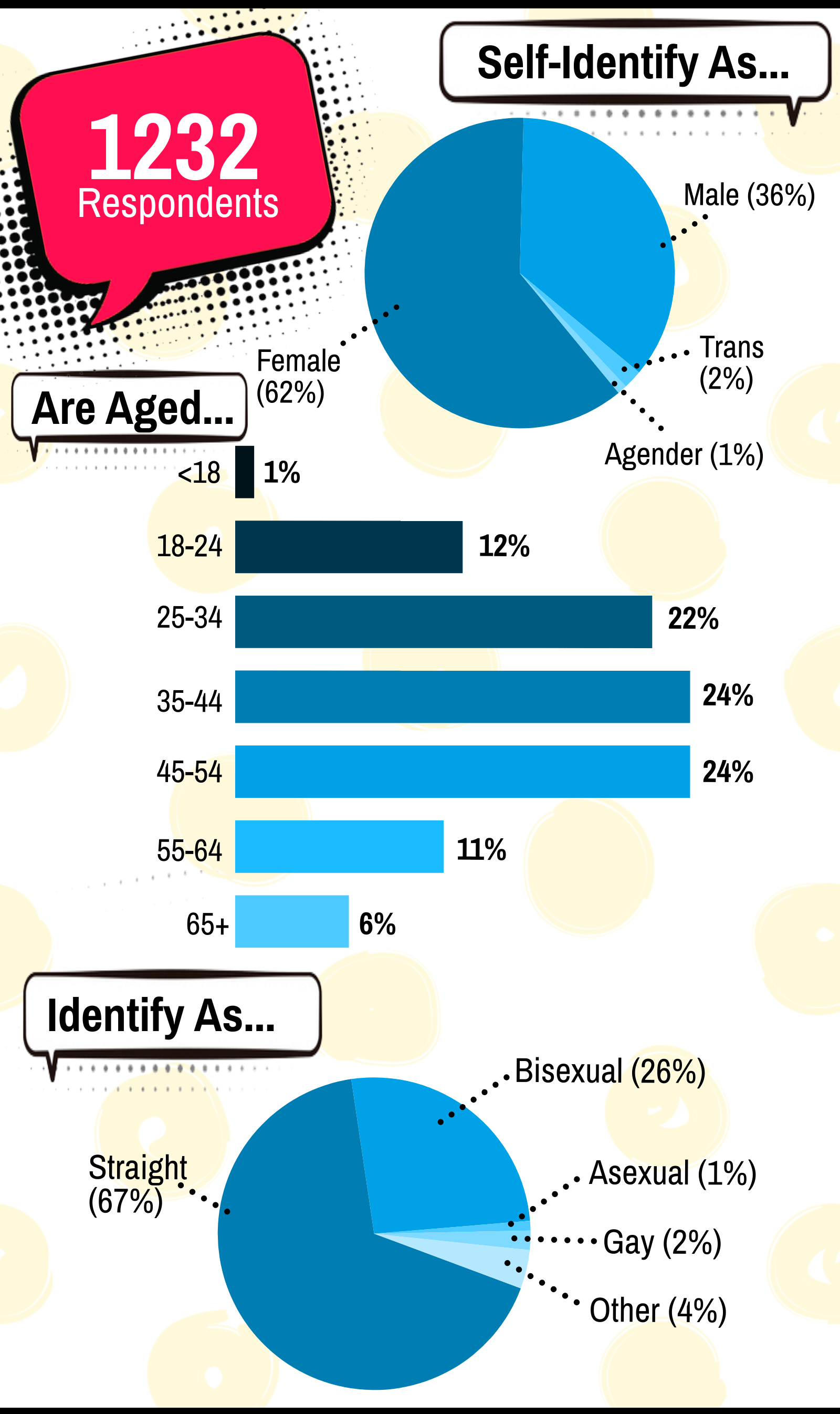
The responses we got were fascinating. We spent hours reading through your comments and answers, but since we don’t expect each of you to do that, here are the key takeaways.
What We Learned

Eighty percent of respondents said they'd faked an orgasm at least once and that, on average, they faked an orgasm about 27% of the time.
But this gets even more interesting when you break the results down by gender.
Editor's Note: We did not get enough respondents that self-identified as trans or agender to draw proper representative conclusions from our survey. To avoid bias, you will note that we have only drawn conclusions for those who identify as male or female.
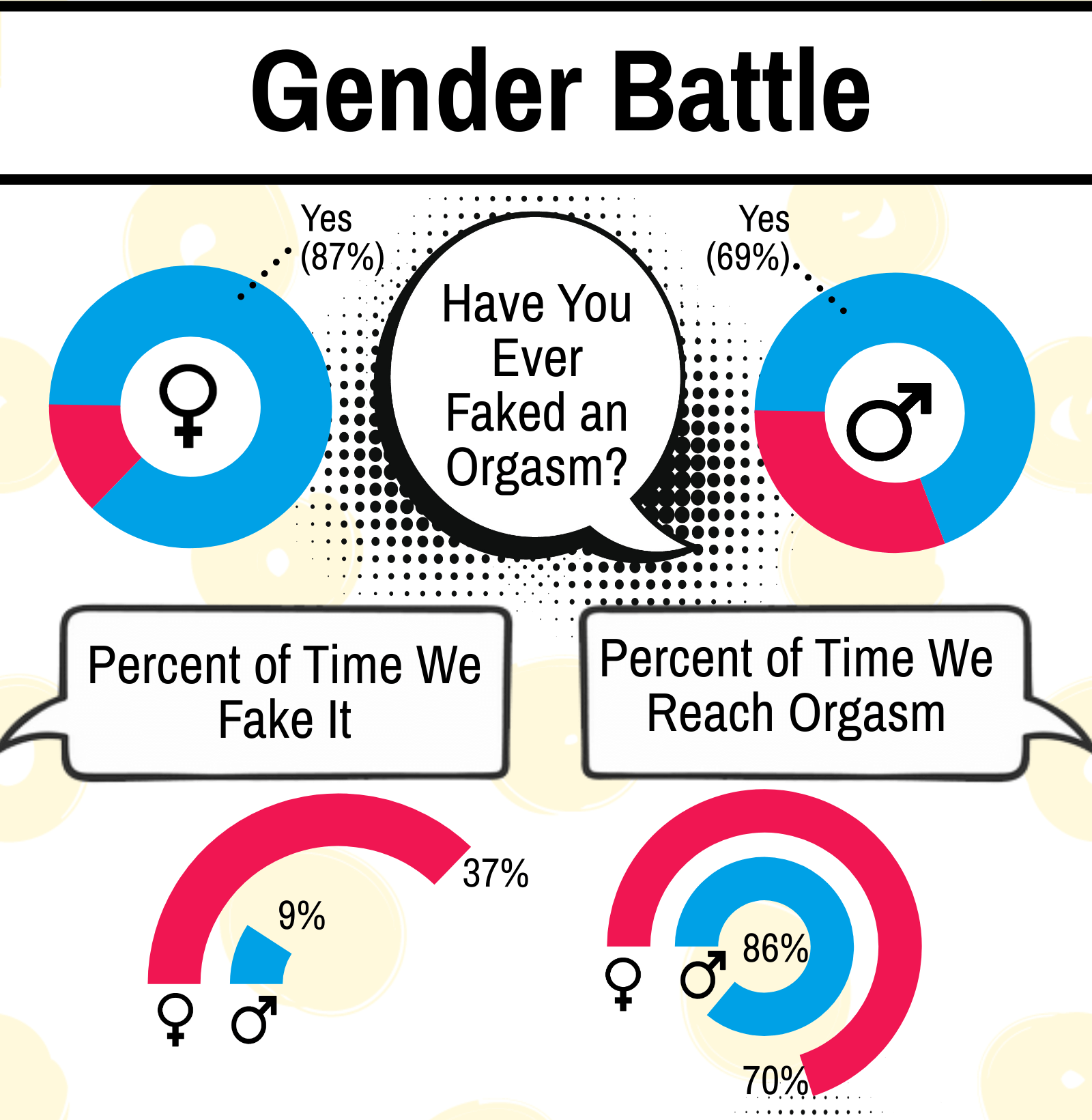
Respondents who identify as men only fake orgasms 9% of the time, but those who identify as women reported that they fake orgasms 37% of the time. So, even though 69% of males said that they have faked at least one orgasm, it’s clear that the 87% of females that fake orgasms are doing it a lot more often than the males.
"It's true that all sexes fee pressure to reach climax during sex as it's seen to be the ultimate reward for 'doing a good job,'" Sienna Halliburton, the marketing manager at luxury sex toy company JeJoue told us.
Thankfully, 97% of all respondents have experienced an orgasm, either alone or with a partner. (YAY, orgasms!)
However, while men responded that they reach orgasm 86% of the time (either alone or with a partner), women said that they only reach orgasm 70% of the time (either alone or with a partner). (Hello there, orgasm gap, we expected you to show up at one point or another.)
Now, let’s get down to the real reason we’re all here: the WHYs.
When, Why and Under What Circumstances We Fake It
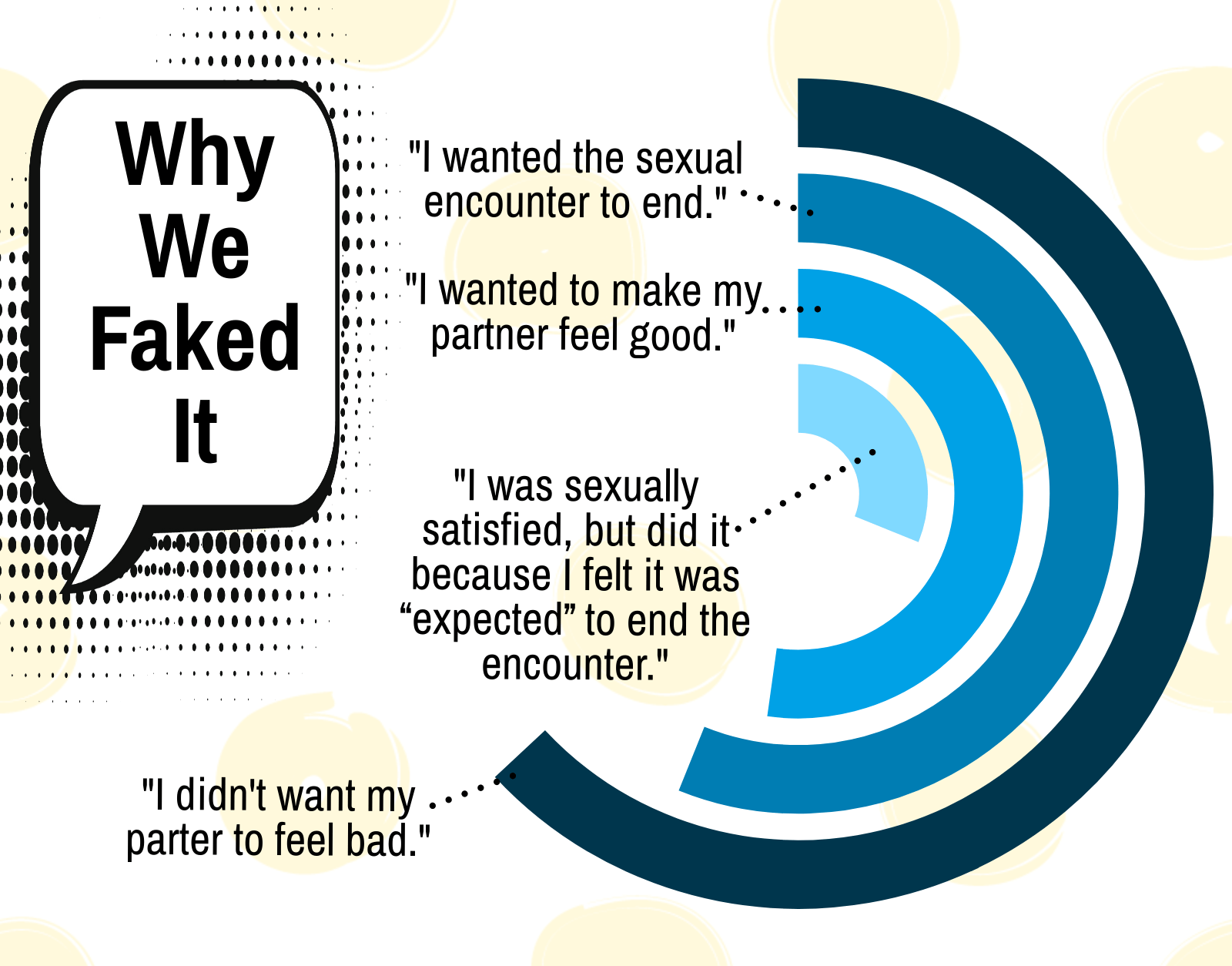
What, exactly, motivates people to fake their orgasms? We got a lot of great comments about that, many of which stemmed from how much pressure people felt to end a sexual encounter with an orgasm.
One of the most interesting insights from our female respondents, however, is that they seem to fake their orgasms the most when they’re younger; as they aged, they learned that they didn’t have to fake it.
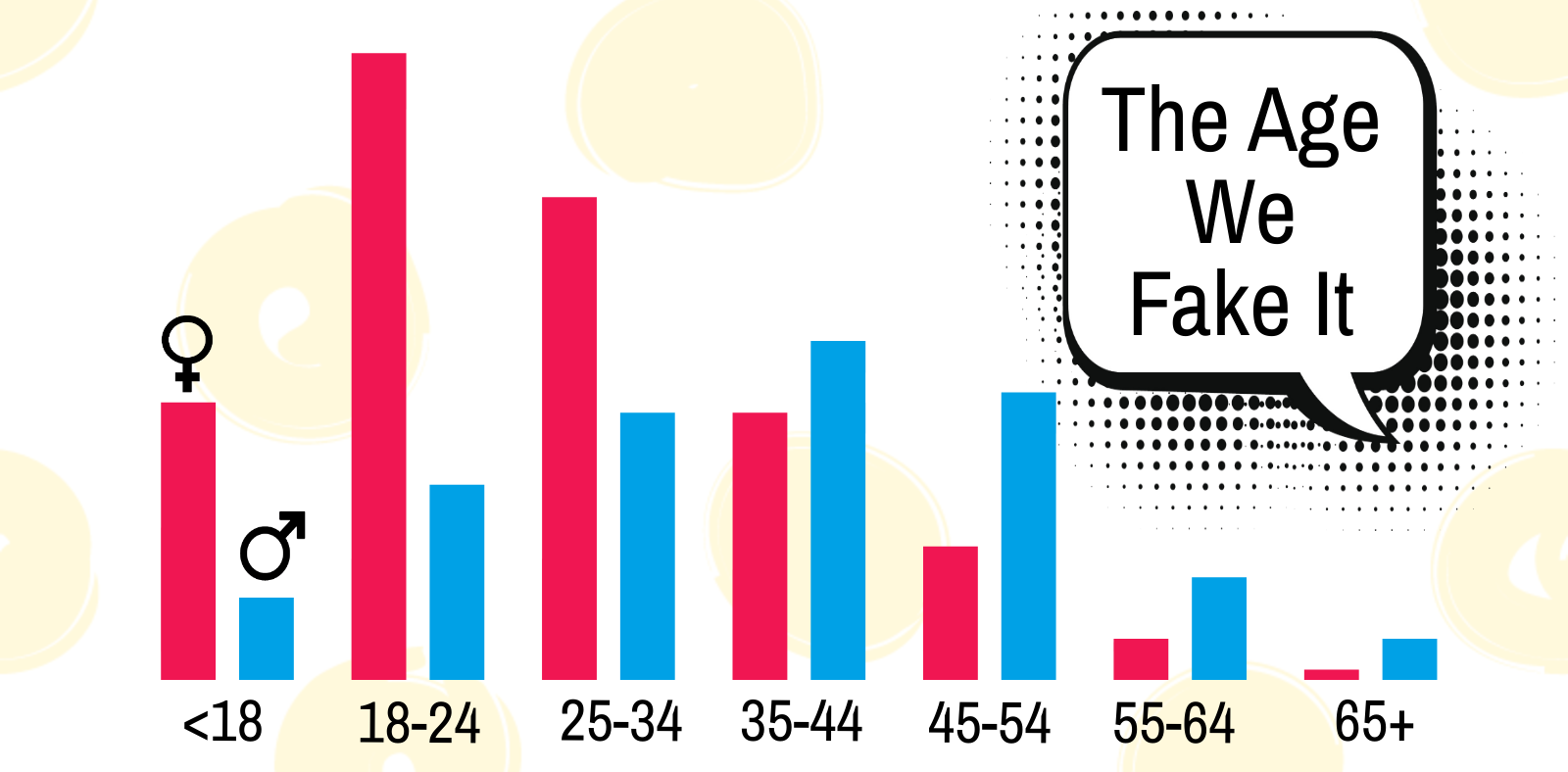
Surprisingly, this was not the case for men. Male respondents said that they fake orgasms most often between the ages of 35 and 44.
The one finding we found extra surprising was that respondents said they faked orgasms most often with long-term partners.
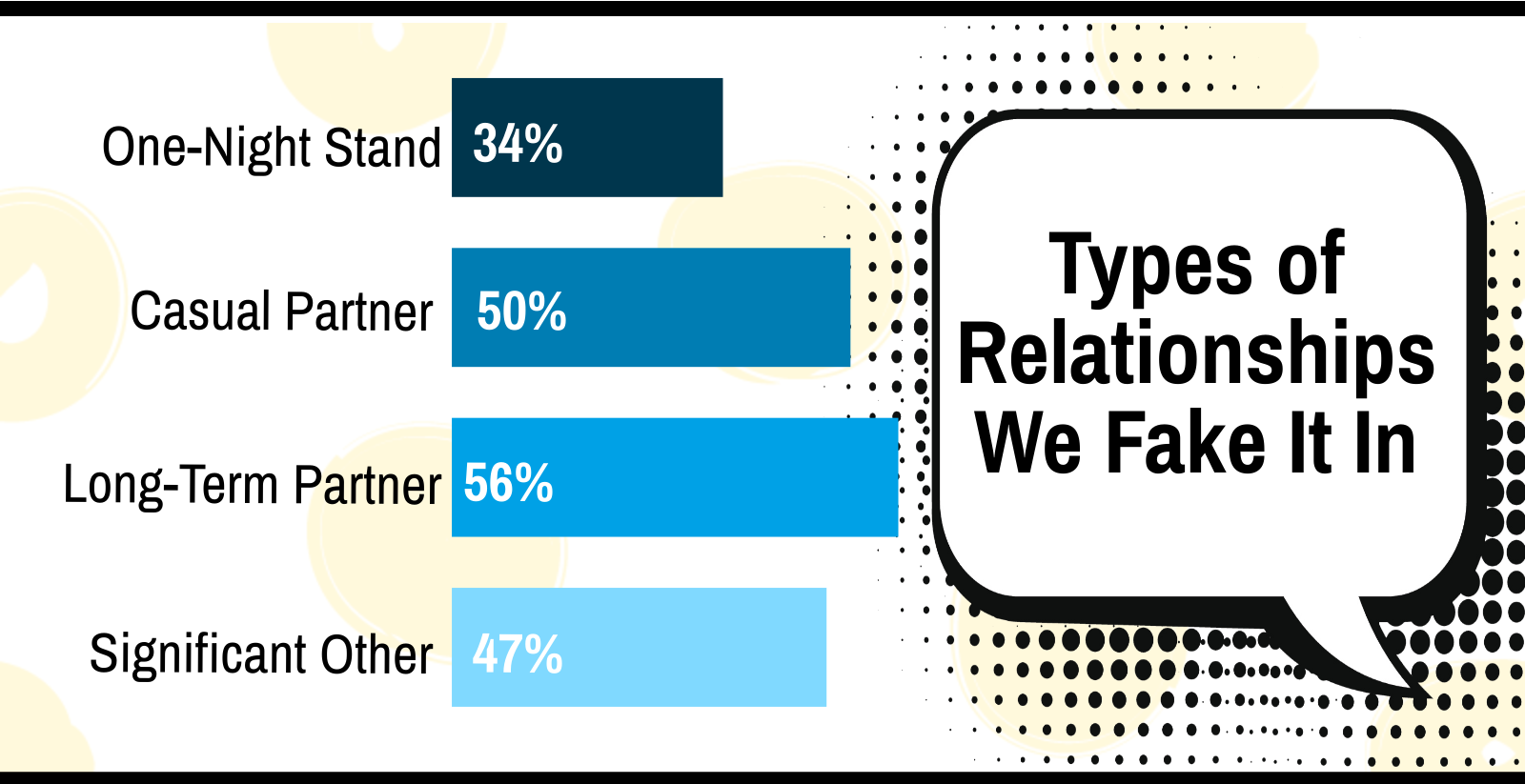
Furthermore, even though 80% of all respondents have faked at least one orgasm, all of us fakers seem to be very good at it ... or, at least, we think we are.
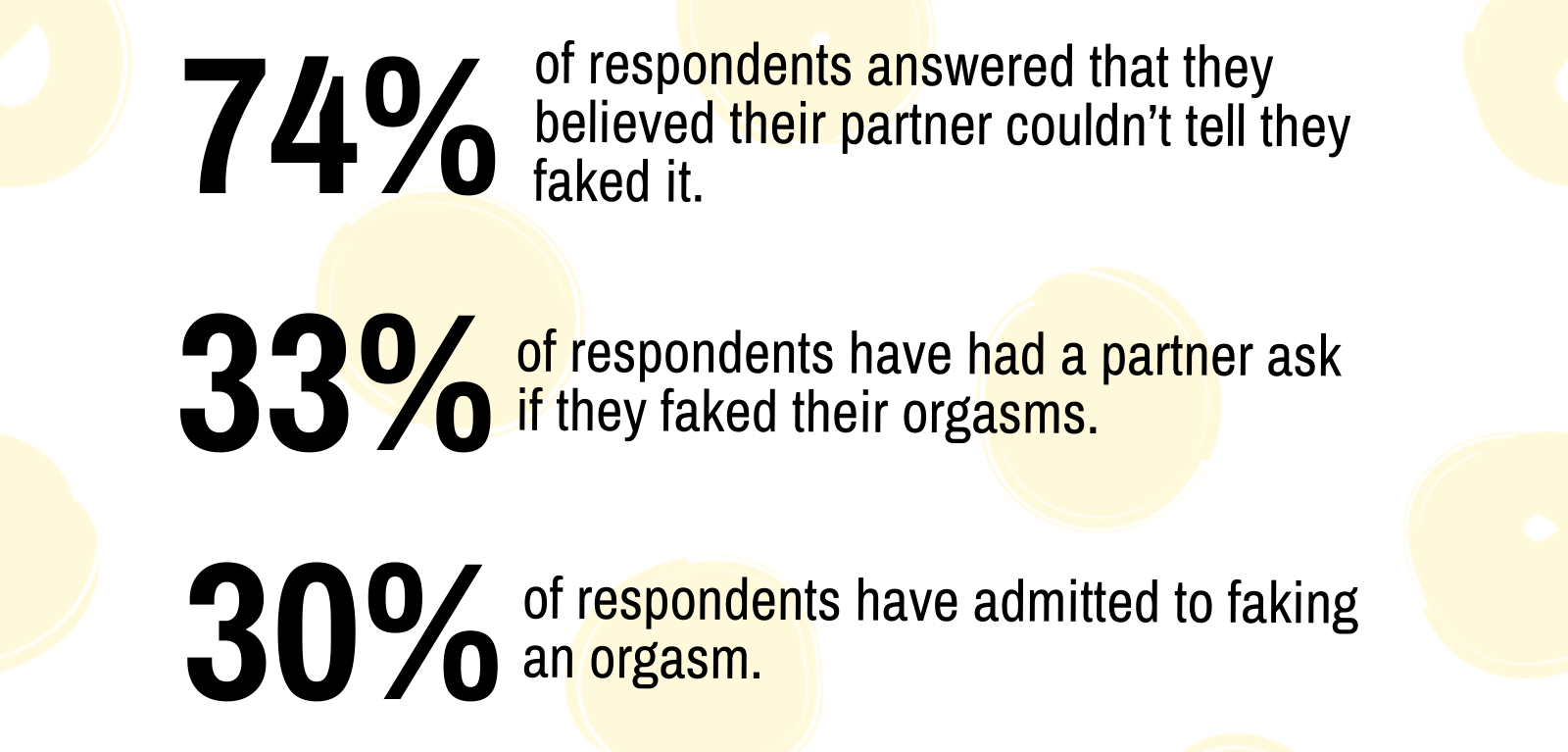
Of all the respondents, only 30% have ever admitted to faking an orgasm (either with their current partner or a previous one). So, although this is something that the majority of us do, it’s not something we openly talk about with our partners, even in long-term relationships.
Clearly, communication is something we could all stand to put a little more work into!
Our biggest takeaway from the survey is how much support there is for the myth that sexual encounters have to end with an orgasm. (Hint: They don't!)
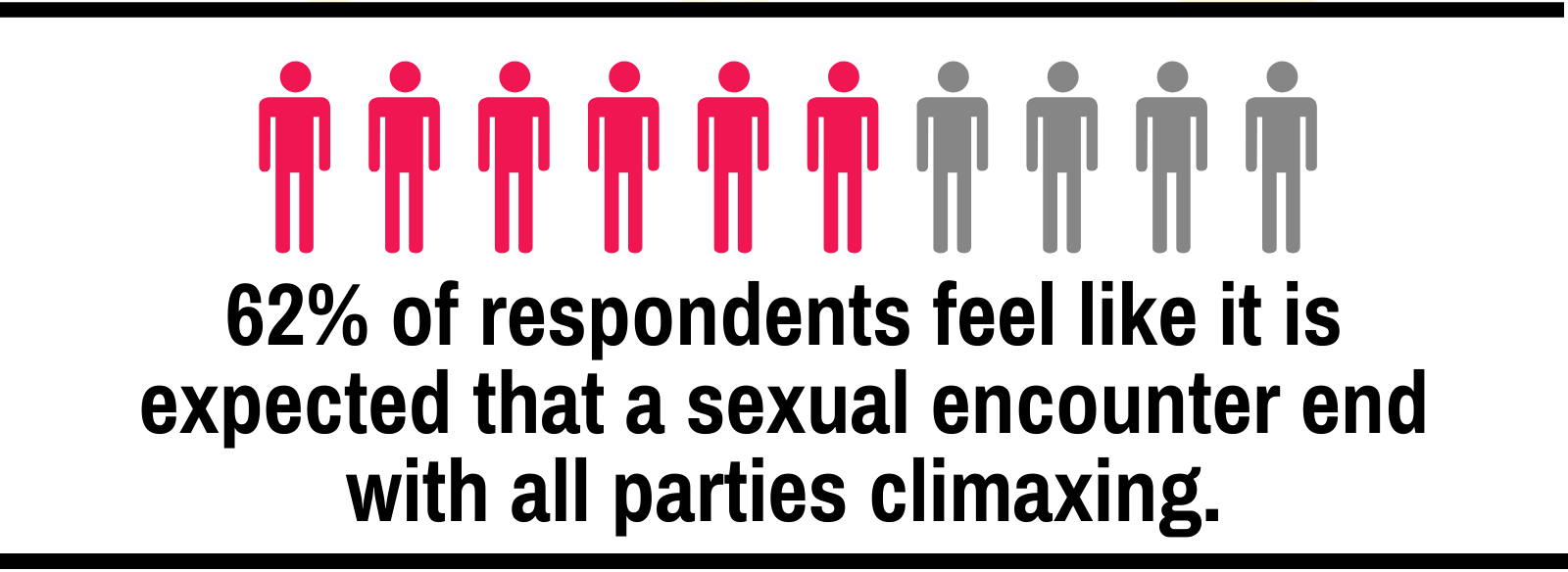
So, What Did We Learn?
Well, first and foremost, we learned that we need to stop faking our orgasms! We were on board with that message already, but this survey did shed some light on how faking it affects us emotionally and psychologically.
Words like “failed” and “ashamed” were prominent in our long response questions. Faking an orgasm tends to make people feel bad about themselves.
“Like I failed at sex, basically. Ashamed.”
“Pretty sure she would feel like she'd failed if I didn't cum.”
“I didn't know any better and thought it was my fault for not cumming.”
“I know if an encounter ends and my partner hasn’t climaxed I feel self conscious and bad. I don’t want them to feel like that.”
These responses bring us back to that prevalent myth that sexual encounters need to end with everyone involved having an orgasm. Let’s bust that myth right here and now:
SEXUAL ENCOUNTERS ARE ABOUT EXPERIENCING PLEASURE.
ORGASMS ARE NOT A SIGN OF A “SUCCESSFUL” SEXUAL ENCOUNTER!
There was a bit of light at the end of this sad tunnel, though. A lot of respondents said that they faked it when they were young and didn’t fully understand their own pleasure or what was “expected” during sex. However, as they grew up, they realized that orgasms aren’t necessary for enjoyment, and they learned how to tell their partner what they like.
“I used to fake orgasms when I was younger. I don’t any more. If I don’t orgasm during sex, I get my trusty Wand out and get my own.”
“I was young. I didn't know how to say what I want/need. Sometimes, I just wanted to be done with it because it wasn’t doing anything for me. I learned better. I never fake now. If they aren’t getting me there, I’ll say so, help out, or just take care of it after. Orgasm isn’t required.”
One of the most surprising results of the survey was that 52% of respondents were faking orgasms with long-term partners and 44% were faking them with their significant others. Most experts would argue that these are the relationships that we should be able to communicate the best in.
However, when we asked respondents what happened when they admitted to a partner that they faked an orgasm, we were even more shocked by some of the answers.
“He was extremely mad and he said that I made him feel like less of a man.”
“End of relationship.”
“They got upset with me and told me they wouldn't be able to trust me again.”
“The partner was insulted and felt like he wasn’t good enough, and like I prevented him from being allowed to continue to try and work towards it.”
“They were butt hurt. They then made it their mission to get me to orgasm (without toys) as if it was a challenge to prove their manliness.”
“They asked me to reduce or not do it anymore. They did not want to talk about my needs, though. They simply asked me not to do it anymore.”
“When I told my husband it was a disaster. He got really depressed and uncommunicative so I try to keep it to myself.”
“Nothing, really. He wasn't upset but there was no improvement on making sure I reach orgasm.”
“We got into a huge fight because the way he saw it was that it was me and not him, that he knew what he was doing far too much to fail at the job and that because of that, there must be something wrong with me. The relationship didn’t last too much longer after that.”
Although the negative experiences people had when they fessed up about faking far outweighed the positive ones, there were positive outcomes as well. There were some people who said that opening up about their fake orgasms helped their relationship and their sexual encounters:
“He was slightly saddened by it, but made it his goal to pay attention to my needs more.”
“They were a little upset, but then said 'hey, that's OK, let's try again soon and just let me know sooner what I can do to help push you over the edge to have an orgasm.'"
“Partner admitted she thought it would help keep me going. We discussed not needing to do that with me and just to let things play out naturally.”
“It opened up a path to better communication.”
“Sex became more adventurous and less vanilla.”
The two-part lesson learned from these responses:
- Some people just suck
Whether or not someone orgasms is not anyone’s FAULT, and we need to do a better job of making that clear in our relationships.

Breaking Stereotypes About Orgasms
So, now that we know all of this, what can we do to change it? A lot of it comes down to sexual education. We need to start spreading that knowledge that sex is about pleasure, not orgasms.
Somewhere along the line, that message isn’t being delivered, especially to younger people who are just beginning to experiment with their sexuality. While the notion that sexual encounters should end with both parties simultaneously orgasming is lovely, it’s also extremely unrealistic.

We need to change the message. Sex isn’t (and shouldn’t be) goal oriented. There isn’t some checklist you need to make your way through in order to reach that big “O” at the end.
Sex is about the journey!
The myth that all parties need to orgasm during sex just puts added pressure on everyone involved. It’s like taking a test with your parents screaming in your ear that you NEED to get an A. How are you supposed to focus with that going on?
Our survey also shone some light on how the myth of necessary orgasms is adding to toxic masculinity and gender stereotypes. While the orgasm gap is a real thing, the reasons behind it go far beyond anatomy, and the notion that men can (or should) reach orgasm quickly and easily is just as damaging.

Over time, the myth that men HAVE to orgasm has taken hold in a large portion of society. Those expectations are good for nothing except creating sexual performance anxiety and contributing to toxic masculinity.
“I’m a guy, so the expectation is that no matter what, we’re going to orgasm. The few times I’ve ever faked it, the encounter had been going on for quite some time. I don’t know if she was worn out or just not that into the encounter but I was completely worn out and the whole situation just needed to stop. She kept looking at me like she was ashamed that she wasn’t pleasing me, and it killed the whole mood for me. So ... I faked it.”
“I am a male. Women expect us to climax easily, every time. However, decades with my ex wife left me more than a little messed up. I usually take a long time to reach orgasm and start to feel as if I’m being selfish to keep on trying to reach climax. Once that thought hits, it ain’t happening.”
“Men sometimes seem to feel inadequate if they don’t give a woman an orgasm, but the truth is, sometimes it just doesn’t happen!! It has nothing to do with their ability or equipment.”
“As a man, it feels like there is an expectation that I should orgasm - it makes me feel pressured to enjoy the sex more even when I am enjoying it as is!”
Remember, 62% of men and 61% of women that responded to our survey said they feel like it’s expected that a sexual encounter end with all parties climaxing.
So, how can we solve this? Well, for starters, we can simply not be shitty people. By that we mean, we need to stop judging one another - and ourselves.
Sex has this magnificently terrible ability to bring out our worst thoughts about ourselves, which really isn’t all that surprising. During sex, you’re open and vulnerable, both physically and emotionally. It’s so easy for those negative thoughts to come creeping in.
One of the ways we can work toward solving these issues is by learning how to communicate during sex. Communication is key in any relationship, including sexual ones!

Here are our some pro-tips for fostering a positive communication about and during sex:
- Be honest! NO MORE FAKING.
- Verbalize your likes and dislikes in a conversation outside the bedroom. (It's best not to do this right after a sexual encounter so that your partner doesn’t take it as criticism.)
- Use positive and supportive language during sex. It’s better to explain what you like rather than what you don’t like.
- Be open-minded and non-judgmental. Of course, you can always say no to things, but take the time to listen and learn from your partner’s suggestions.

Share this Image On Your Site
Sex is a bit like a secret society; everyone's doing it, it's just that no one talks about it. Kinkly's mission is to start that conversation, answer your questions and help you discover new and exciting things about sex, love and your body. We guarantee it'll be illuminating, enlightening, fun ... and a little kinky. And that's OK with us.No innuendos, no judgments and no apologies, just fearless, straight-up talk about sex.




